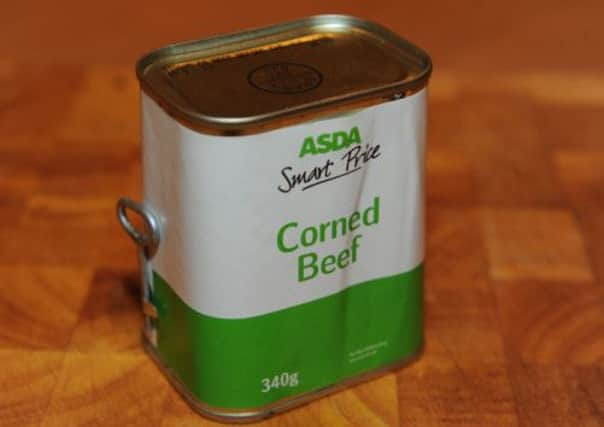New horsemeat scandal as banned drug found in Asda corned beef


The Leeds-based supermarket announced last night that it was recalling all corned beef from its budget range after results returned to them yesterday reported traces of veterinary drug phenylbutazone had been found in some batches.
The Food Standards Agency has confirmed that “very low levels” of the painkilling medicine, known as bute, were detected in the Asda Smart Price Corned Beef, but stressed that it was “very unlikely” to cause harm.
Advertisement
Hide AdAdvertisement
Hide AdCustomers who have bought the 340g tins, with any date code, have been urged not to eat the corned beef but to return it to the supermarket.
Asda withdrew the product on March 8 after it was found to contain more than 1% horse DNA. Bute was detected in some samples, at the level of four parts per billion (4ppb), when further tests were carried out.
Shadow environment secretary Mary Creagh said the discovery of bute in the corned beef was “worrying”.
The Labour MP said: “It is deeply worrying that bute, a drug banned from the human food chain, has been discovered in one brand of corned beef.
Advertisement
Hide AdAdvertisement
Hide Ad“This product was withdrawn from sale on March 8 yet has only been formally recalled now, after testing positive for bute, meaning people could have unwittingly been eating meat containing this drug for the last month.
“This exposes the weaknesses in the Government’s handling of the horse meat scandal where products were withdrawn but in some cases not tested either for horse meat or bute. The interests of the consumer should have been put first.”
But an Asda spokesman said the supermarket did everything possible to keep customers informed about the product.
He said: “Regular customers tend to shop for the same products every week. There was very clear signage in the stores around this product. It’s not like we’ve just taken this off the shelves and hoped no one would notice.
Advertisement
Hide AdAdvertisement
Hide Ad“We were testing for horse meat, and when we found it we then looked for bute. This is the process.
“When we found bute, which was yesterday, we let everyone know immediately in the most high profile way possible.”
The corned beef is the only meat product in which bute has been found, according to the FSA.
Bute had been discovered in horse carcasses in February however, with the highest level found being 1900ppb.
Advertisement
Hide AdAdvertisement
Hide AdThe FSA said no other Asda products are thought to be affected and that customers who bought the corned beef should contact the supermarket for a refund.
They said that while animals treated with bute should not enter the food chain, the risk of damage to the health of anyone who had eaten such meat is “very low”.
Andrew Rhodes, director of operations at the Food Standards Agency, acknowledged it takes time to test for bute once horse meat is found in a product.
Speaking on the BBC Radio 4 Today programme, he said: “What we have found in this positive test result is a very low level of (bute)... which is only really just above the limit of detection.
Advertisement
Hide AdAdvertisement
Hide Ad“It’s very unlikely to (do harm). As the chief medical officer has said... it’s extremely rare people have an adverse reaction to phenylbutazone.
“This is considerably lower than a therapeutic dose and you would have to consume enormous quantities of meat, way more than anyone could physically consume, to get near a therapeutic dose.”
Mr Rhodes said it was important to understand how the product came to be contaminated and how it came to have bute in it.
“If someone has done something which is illegal, and not taken due measures to prevent that happening, then they can face sanctions,” he said.
Advertisement
Hide AdAdvertisement
Hide Ad“But we need to determine exactly what has happened in this case before we can determine whether that will happen or not - which is true of any of the cases we have seen.”
Chief Medical Officer Professor Dame Sally Davies previously said: “Horse meat containing phenylbutazone presents a very low risk to human health.
“Phenylbutazone, known as bute, is a commonly used medicine in horses. It is also prescribed to some patients who are suffering from a severe form of arthritis.”
She said the levels of bute previously found in horse carcasses meant a person would have to eat up to 600 burgers, containing 100% horse meat, every day to come close to consuming a human’s daily dose of the drug.
Advertisement
Hide AdAdvertisement
Hide AdDame Sally added: “In patients who have been taking phenylbutazone as a medicine there can be serious side effects but these are rare. It is extremely unlikely that anyone who has eaten horse meat containing bute will experience one of these side effects.”
Horse carcasses in the UK need to have a negative bute test before they can enter the food chain.
In a statement on the Asda website, the supermarket said it was also recalling tins of Chosen By You corned beef.
“The tinned Chosen By You Corned Beef (340g) product, also withdrawn in March, has not tested positive for phenylbutazone,” the statement read.
Advertisement
Hide AdAdvertisement
Hide Ad“However as a precaution it is also being recalled as it is made in the same factory.”
Asda claimed to have taken “an extremely cautious approach since the very beginning” and had carried out more than 700 tests so far, “moving swiftly to remove any products” when they had any concerns.
The supermarket added: “The FSA has reassured us that the quantities we’ve found pose a low risk to human health.”